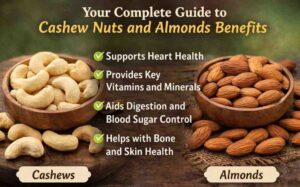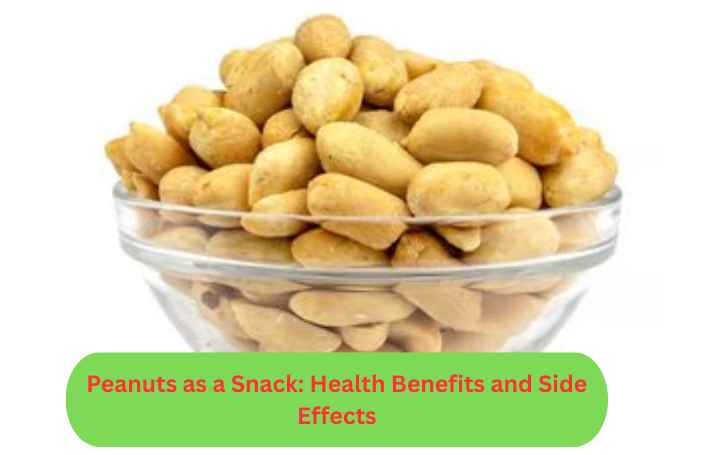
Peanuts as a Snack: Health Benefits and Side Effects OF PEANUTS

Introduction
Peanuts are one of the world’s most widely enjoyed snacks—eaten roasted, salted, boiled, or as peanut butter. Though classified as legumes, they share many nutritional traits with tree nuts, being rich in protein, healthy fats, fibre, and key vitamins. They’re inexpensive, easy to find, and incredibly adaptable, making them a go-to snack for quick energy or lasting fullness. Still, while peanuts bring many benefits, overconsumption or poor quality can pose health concerns.
This blog explores both the advantages and possible downsides of adding peanuts to your daily diet, helping you make smarter, well-informed snacking choices.
Health Benefits of Peanuts
1. Rich Source of Plant-Based Protein
Peanuts are packed with plant-based protein, making them a great choice for vegetarians and vegans. Protein helps repair muscles, supports growth, and keeps you feeling full longer—ideal for managing hunger between meals.
2. Supports Heart Health
Peanuts contain heart-friendly monounsaturated and polyunsaturated fats that help lower LDL cholesterol. They also contain resveratrol, an antioxidant that may reduce inflammation and protect blood vessels, supporting long-term heart health when consumed moderately.
3. Helps in Weight Management
Despite being calorie-dense, peanuts may aid in weight control. Their mix of healthy fats, protein, and fibre promotes fullness and reduces overeating. Studies suggest regular, moderate peanut intake doesn’t lead to weight gain in most people.
4. Improves Brain Function
Peanuts provide niacin and folate, key nutrients for brain health. Niacin supports mental clarity and memory, while folate plays a vital role in fatal brain development. Some research links niacin-rich diets to a reduced risk of cognitive decline with age.
5. Supports Blood Sugar Control
With a low glycaemic index, peanuts help stabilize blood sugar levels, making them a smart snack for people managing diabetes. As long as they’re unsalted and unsweetened, peanuts can offer steady energy without glucose spikes.
6. Affordable and Convenient
Peanuts are budget-friendly and easy to store, making them a practical everyday snack. Whether eaten raw, roasted, or blended into recipes, they offer versatility without compromising nutrition—especially when compared to pricier nuts.
Possible Side Effects of Peanuts
Although peanuts offer valuable health benefits, they may cause problems for some individuals—especially when consumed in excess or in the presence of certain health sensitivities.
1. Allergic Reactions
Peanuts allergies are among the most serious and widespread food allergies. Even trace amounts can cause severe reactions, including rashes, swelling, breathing difficulty, or dizziness. People with a known peanut allergy must avoid peanuts in all forms and carry emergency medication.
2. Risk of Aflatoxin Contamination
Peanuts can be affected by aflatoxins—toxins produced by moulds that grow in warm, humid conditions. Long-term exposure may increase liver cancer risk. To reduce this danger, buy only from trusted brands, and avoid peanuts that look mouldy or discoloured.
3. High in Calories
Though nutritious, peanuts are calorie-dense. Overeating them without adjusting your diet can lead to weight gain. A healthy portion is about 28 grams (roughly a small handful) per day. Portion control is key to getting the benefits without the excess calories.
4. Sodium in Salted Peanuts
Many store-bought peanut snacks are heavily salted. High sodium intake can raise blood pressure and increase the risk of heart disease. If you regularly eat peanuts, opt for unsalted or lightly salted versions to help keep your sodium levels in check.
5. Digestive Discomfort
Some people may experience gas, bloating, or stomach upset after eating peanuts. This may result from their fibre or fat content, especially when consumed in large amounts. If peanuts cause discomfort, reduce your portion size and monitor your body’s response.
Best Ways to Include Peanuts in Your Diet
- A small handful of dry-roasted, unsalted peanuts as a snack
- A spoon of natural peanut butter on whole grain toast or apple slices
- Crushed peanuts in Asian-style stir-fries or salads
- Blended into smoothies or used as a thickener for sauces
Avoid deep-fried peanuts and heavily processed peanut products with added sugars or oils.
Final Thoughts
Peanuts are a nutrient-rich, affordable snack that offers a variety of health benefits—from boosting heart and brain function to supporting fullness and blood sugar stability. Still, it’s important to eat them in moderation, especially considering their high calorie content and the risk they pose to those with allergies.
For most people without sensitivities, adding peanuts to a balanced diet can be both practical and nutritious—providing great taste and lasting fuel in every serving.



